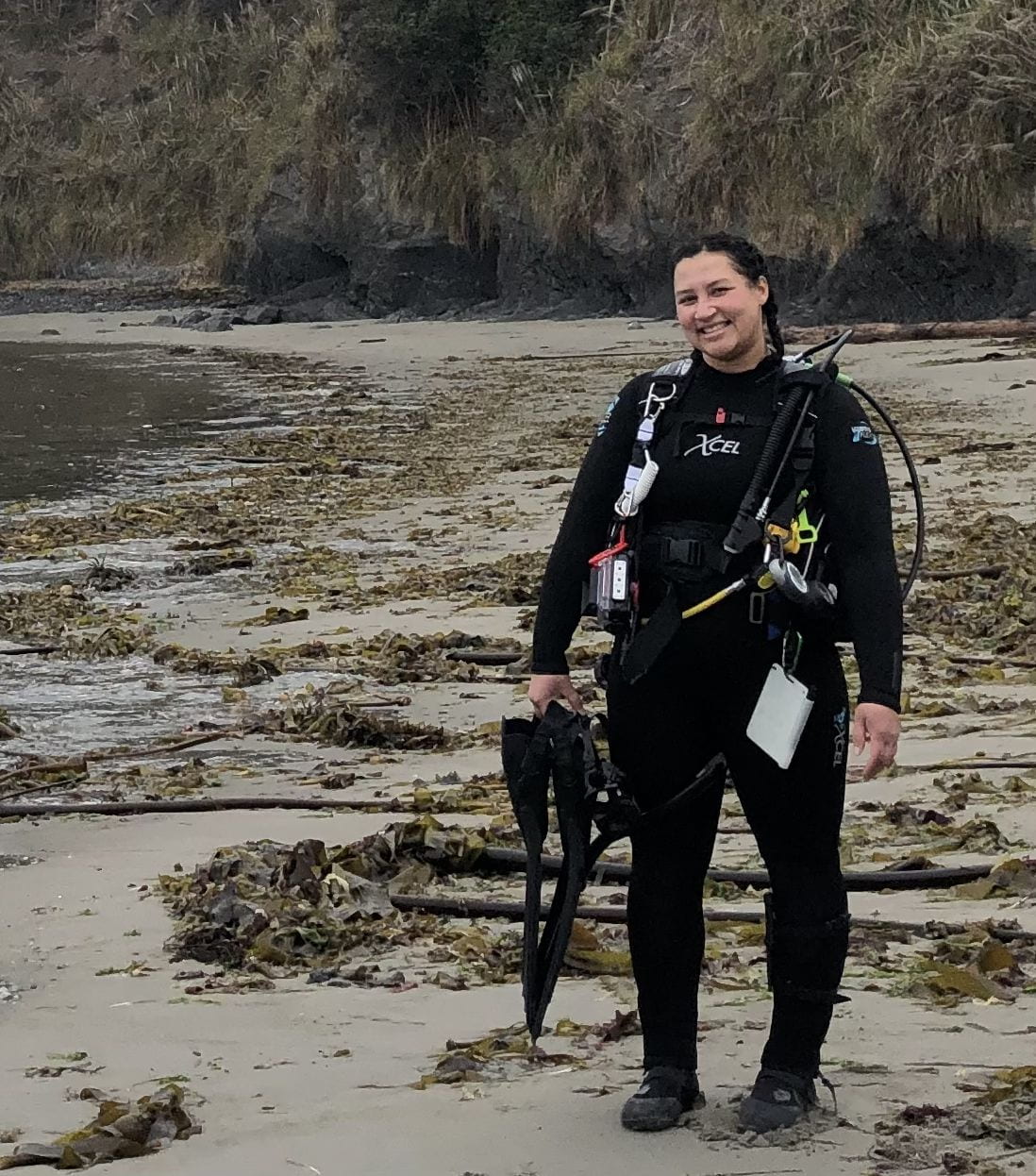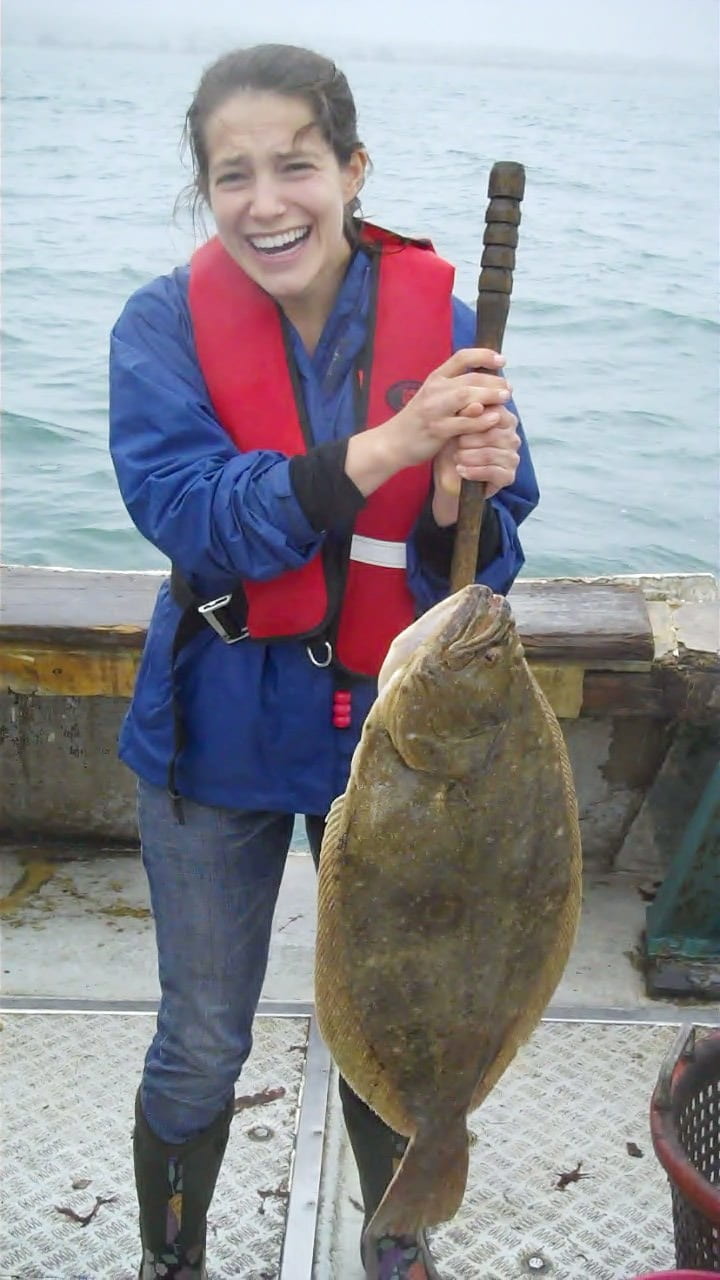Team

Angela Jones
Ph.D Student
2019 M.S. Biology Humboldt State University
2016 B.S. Zoology Humboldt State University
I am a doctoral student in the Marine and Environmental Sciences at Northeastern University. My interests are in functional micromorphology of invertebrates in the rocky intertidal. My previous work focused on intertidal ecosystems in Northern California. In my undergraduate, I worked on biodiversity of invertebrates and algae in the rocky intertidal spanning fifteen sites. During this time, I also monitored Sea Star Wasting Disease in the sea star Leptasterias spp in the laboratory and in all local species in the field.
My master’s work, was focused on aboral spine variation in the keystone predator Pisaster ochraceus, the ochre sea star, across environmental gradients with locations from Washington to Northern California. That project molded a lot of my current interests of blending natural history and modern technology including field assays, histology, scanning electron microscopy, micro CT scanning, and more. During this project, I was one of the leads on a project examining eelgrass, Zostera marina, to understand trophic interactions with the potential for bottom up carbon sequestering to mitigate environmental stressors largely effecting invertebrates that are expected to increase with climate change.
Overall, my interests and experiences vary across intertidal habitats to understand ecological relevance of organismal variation. In the Helmuth lab, I hope to continue rigorous science, but also connect with the community and synthesize the information for public consumption. Ideally, this is done with the hopes of making science more accessible, entertaining, and approachable for all.
In my free time, I enjoy creating marine themed functional pottery, scuba diving, and volleyball.

Tasha Eileen O’Hara
Ph.D Student
2019 M.R.M. University of Akureryri
2010 B.A. University of Rhode Island
I am a doctoral student in Marine and Environmental Sciences. My broad research interests include marine monitoring, fisheries, and assessing the impacts of climate change and offshore development on marine ecosystems and coastal communities. I am passionate about community and ecosystem resiliency and I believe it’s important to continuously find new ways to bridge gaps between scientists, managers, marine users, and the public to solve emerging problems.
I’m currently a Research Biologist at Coonamessett Farm Foundation, a marine science non-profit based in Cape Cod. I am the lead PI for the annual Atlantic sea scallop (Placopecten magellanicus) stock assessment survey, utilizing underwater cameras and integrated environmental sensors, as well as other STEM and fisheries education initiatives. Prior to this, I worked in the Ecosystems Surveys Branch at NOAA Fisheries in Woods Hole, conducting ecosystem surveys for the Northern Shrimp (Pandalus borealis), Atlantic Sea Scallop, and multispecies groundfish fisheries. I’ve also carried out groundfish surveys in the arctic waters of Alaska and Iceland. For my master’s, I conducted depth-dependent studies of green sea urchin (Strongylocentrotus droebachiensis) reproduction with the Marine and Freshwater Research Institute in Iceland.

Heidi Bucking
Masters Student, Research Assistant
2024 B.S. Marine, Estuarine, and Freshwater Biology University of New Hampshire
I graduated from the University of New Hampshire (UNH) with a degree in Marine, Estuarine, and Freshwater Biology. During my time at UNH, I conducted research at the Isle of Shoals and participated in the university’s Lakes Lay Monitoring Program. At the Isle of Shoals, I had the opportunity to study the Atlantic Hagfish, which remains my favorite organism to date. In the Lakes Lay Monitoring Program, I assisted with research on harmful algal blooms in New Hampshire lakes.
Between college and graduate school, I earned my OUPV Six Pack Captain’s License, allowing me to serve as a captain on marine vessels. I began my graduate studies in Environmental Science and Policy at Northeastern University in January 2025. At the Helmuth Lab, I am currently assisting Angela Jones with her research on sea stars.

Windsyr Maughan
Masters Student, Research Assistant
2024 B.S. Environmental & Sustainability Sciences Northeastern University
I’m a master’s student in Environmental Science and Policy at Northeastern University. I am passionate about marine life and ecosystems. I am interested in understanding the impacts of climate change, mitigative solutions, and the restoration of various ecosystems. As an undergraduate, I compiled a literature review on the value and use of biomimicry in response to environmental change and briefly studied coral reefs in South Africa.
In the Helmuth lab, I am currently assisting PhD Candidate Angela Jones with Sea Star research, learning about species morphology and Sea Star Wasting Disease.
I enjoy spending time in nature, scuba diving, rowing, creating art, and writing music.

Josie Wagner
Masters Student, Research Assistant
2024 B.A. Anthropology Tufts University
I am interested in conservation and population restoration. I was a research assistant at Tufts University at the Kibale Chimp Project, focusing on behavioral insights from wild chimpanzees in Uganda. I worked on collecting hundreds of examples of adult play and completed an independent research project examining the locations of inter-group interactions.
In the Helmuth Lab, I assist PhD candidate Angela Jones in her sea star research. I hope to utilize my skills in the future to make an impact in helping to conserve various species.
In my free time, I enjoy skiing, reading, and spending time outside (ideally with dogs).

Tasha Malcolm
Research Coordinator
Candidate for B.S. in Environmental & Sustainability Sciences Northeastern University
I am a fourth-year undergraduate student at Northeastern and currently on co-op as Research Coordinator in a joint position between the Helmuth Lab and the CORE Lab. My first co-op involved work at a small urban farm building raised beds, selling at local farmer’s markets, and spearheading the farm’s education program. I also grew up backpacking and participating in local conservation projects, experiences that shaped my current interests in ecology, forestry, and environmental education. Eventually, I hope to study integrated human-natural systems as a tool for conservation and environmental justice.
Outside of the lab, I practice solo ice dance and archery, and can often be found collecting miscellaneous rocks or choosing which of my many ongoing craft projects to work on.

